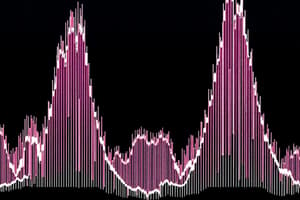Podcast
Questions and Answers
What frequency range is associated with slow oscillations as mentioned in the content?
What frequency range is associated with slow oscillations as mentioned in the content?
- 1 – 4 Hz
- 0.5 – 1 Hz (correct)
- 0.1 – 0.5 Hz
- 4 – 8 Hz
What role do slow oscillations likely play in cognitive processes according to the studies mentioned?
What role do slow oscillations likely play in cognitive processes according to the studies mentioned?
- Consolidation of memory (correct)
- Enhancing motor skills
- Visual processing
- Emotion regulation
What was the purpose of applying so-tDCS in patients with mild cognitive impairment?
What was the purpose of applying so-tDCS in patients with mild cognitive impairment?
- To improve motor coordination
- To stimulate emotional responses
- To enhance sensory perception
- To improve cognitive function (correct)
In the study, how was the stimulation (so-tDCS or sham) administered to the patients?
In the study, how was the stimulation (so-tDCS or sham) administered to the patients?
Which frequency band is measured in the EEG along with slow oscillations according to the content?
Which frequency band is measured in the EEG along with slow oscillations according to the content?
Which of the following tasks is implied to benefit from the application of slow oscillations?
Which of the following tasks is implied to benefit from the application of slow oscillations?
What does the term 'sham stimulation' refer to in this context?
What does the term 'sham stimulation' refer to in this context?
How did the researchers measure the EEG activity following the stimulation?
How did the researchers measure the EEG activity following the stimulation?
What is the role of the hippocampus in learning?
What is the role of the hippocampus in learning?
What characterizes the 'down state' during slow wave sleep?
What characterizes the 'down state' during slow wave sleep?
How does boosting slow oscillations during sleep affect memory performance?
How does boosting slow oscillations during sleep affect memory performance?
What frequency was identified as most effective for stimulating slow oscillations to enhance memory?
What frequency was identified as most effective for stimulating slow oscillations to enhance memory?
Which area of the brain is associated with the slow learning store?
Which area of the brain is associated with the slow learning store?
During which phase does reactivation occur as a result of slow wave sleep?
During which phase does reactivation occur as a result of slow wave sleep?
What measurement can be used to assess the difference between learning and recall performance?
What measurement can be used to assess the difference between learning and recall performance?
What is the main impact of slow wave sleep on the learning process?
What is the main impact of slow wave sleep on the learning process?
What EEG frequency band is most associated with sleep spindles, crucial for memory?
What EEG frequency band is most associated with sleep spindles, crucial for memory?
During which stage of sleep do slow wave sleep (SWS) predominantly occur?
During which stage of sleep do slow wave sleep (SWS) predominantly occur?
Which frequency range is considered slow oscillations during sleep?
Which frequency range is considered slow oscillations during sleep?
What is a critical function of sleep as per the two-stage model of memory consolidation?
What is a critical function of sleep as per the two-stage model of memory consolidation?
Which of the following is NOT a characteristic of REM sleep?
Which of the following is NOT a characteristic of REM sleep?
What effect did stimulating the brain at gamma frequency have on beta amyloid pathology?
What effect did stimulating the brain at gamma frequency have on beta amyloid pathology?
How do changes in sleep patterns relate to diseases such as Alzheimer's?
How do changes in sleep patterns relate to diseases such as Alzheimer's?
What frequency range of fast sleep spindles is critical for memory?
What frequency range of fast sleep spindles is critical for memory?
What role does the prefrontal cortex (PFC) play in cognitive functions?
What role does the prefrontal cortex (PFC) play in cognitive functions?
What is necessary for the normal function of the hippocampus and the prefrontal cortex?
What is necessary for the normal function of the hippocampus and the prefrontal cortex?
What identifies coherent excitability changes in neuronal groups?
What identifies coherent excitability changes in neuronal groups?
What effect does cell damage have on cognitive function?
What effect does cell damage have on cognitive function?
What type of oscillations are suggested to play a critical role in learning tasks?
What type of oscillations are suggested to play a critical role in learning tasks?
Which frequency band is primarily associated with memory functions in the hippocampus?
Which frequency band is primarily associated with memory functions in the hippocampus?
What is the relationship between local field potentials and cognitive tasks?
What is the relationship between local field potentials and cognitive tasks?
What aspect of spatial memory tasks involves the hippocampus?
What aspect of spatial memory tasks involves the hippocampus?
What frequency range is classified as theta rhythms in EEG?
What frequency range is classified as theta rhythms in EEG?
Which EEG frequency is primarily associated with alert wakefulness?
Which EEG frequency is primarily associated with alert wakefulness?
In the context of spatial memory tasks, when does increased theta activity occur?
In the context of spatial memory tasks, when does increased theta activity occur?
What characterizes the local field potential signal?
What characterizes the local field potential signal?
In a virtual water maze task, what is primarily measured to assess navigation skills?
In a virtual water maze task, what is primarily measured to assess navigation skills?
Which frequency band is associated with delta rhythms?
Which frequency band is associated with delta rhythms?
What are gamma oscillations in EEG generally associated with?
What are gamma oscillations in EEG generally associated with?
Which EEG frequency range is typically indicative of strong mental engagement?
Which EEG frequency range is typically indicative of strong mental engagement?
Study Notes
Power Spectra and EEG Signals
- Fourier transform reveals frequency components of brain activity.
- Different EEG signals categorized into frequency ranges:
- Slow waves: < 1 Hz
- Delta rhythms: 0.5 - 4 Hz (associated with deep sleep)
- Theta: 3 - 7 Hz
- Alpha: 9 - 11 Hz
- Spindles: 8 - 15 Hz
- Beta: 15 - 30 Hz (indicates alert awake state)
- Low Gamma: 30 – 60-80 Hz
- High Gamma: > 60/80-150 Hz
- Ultrafast: > 100 Hz
- All frequencies play roles in memory functions.
Spatial Memory in Humans
- MEG study on virtual water maze task assesses spatial navigation.
- Participants navigate to a hidden platform using visual cues.
- Path length and escape latency measured for cognitive mapping.
Theta Oscillations and Navigation
- Increased theta oscillations (4-8 Hz) observed in the hippocampus during goal-directed navigation.
- No significant change in other frequency bands noted during navigation tasks.
Local Field Potential and EEG Generation
- Local mean field potential reflects activity from numerous interacting neurons.
- Distinctions made between declarative tasks (facts/events) and procedural tasks (motor skills).
Slow Oscillations and Cognitive Function
- EEG shows two key bands: slow oscillations (0.5 – 1 Hz) and spindles (8-12 Hz).
- Increased activity in these bands during stimulation supports their role in consolidation.
Improving Cognition
- Slow transcranial direct current stimulation (so-tDCS) explored in patients with mild cognitive impairment (MCI).
- Stimulation delivered during stage 2 sleep to evaluate cognitive improvement effects.
The Prefrontal Cortex (PFC)
- PFC is crucial for executive functions including memory, attention, and planning.
- Human version is termed dorsolateral PFC; in rodents, medial PFC performs similar functions.
The Hippocampus
- Central for memory functions in both humans and animals.
- Effective communication between the hippocampus and PFC is essential for normal cognitive function.
Neuronal Synchrony and Learning
- Spike timing control enhances neuronal communication, critical for cognitive function.
- Loss of synchrony due to cell damage leads to cognitive impairments.
Gamma Frequency Oscillations and Learning
- Beta/gamma coupling between entorhinal cortex and hippocampus increases during learning tasks.
- Absence of learning results in decreased coupling.
Slow Wave Sleep and Memory
- Reactivation of memory during slow wave sleep (SWS) enhances learning.
- Slow oscillations (0.5 - 1 Hz) play a key role in memory consolidation during SWS.
Restoring Gamma Oscillations
- Studies focus on stimulating gamma frequency in transgenic AD mice to address beta amyloid pathology.
- Current findings indicate the debate is ongoing regarding the efficacy of this approach.
Sleep Architecture
- Human sleep characterized by light sleep (stages 1 and 2), slow wave sleep (stages 3 and 4), and REM/non-REM stages.
- Early sleep predominantly consists of SWS, transitioning to REM in later periods.
Importance of Sleep for Memory
- Normal sleep rhythms are critical for cognitive functioning, with notable changes in diseases such as Alzheimer's.
- Spindles (8-15 Hz, fast spindles at 12-15 Hz) and slow oscillations (< 1 Hz) critical for memory processes.
Memory Consolidation Model
- "Two stage model" proposed for memory consolidation aligning fast learning store with slow learning store for reactive memory traces.
Studying That Suits You
Use AI to generate personalized quizzes and flashcards to suit your learning preferences.
Related Documents
Description
This quiz explores the concepts of power spectra and the Fourier transform, focusing on how frequency components of activity can be derived. Delve into the implications of these techniques in cognitive trends as outlined by Ward. Test your understanding of these fundamental concepts in signal analysis.




